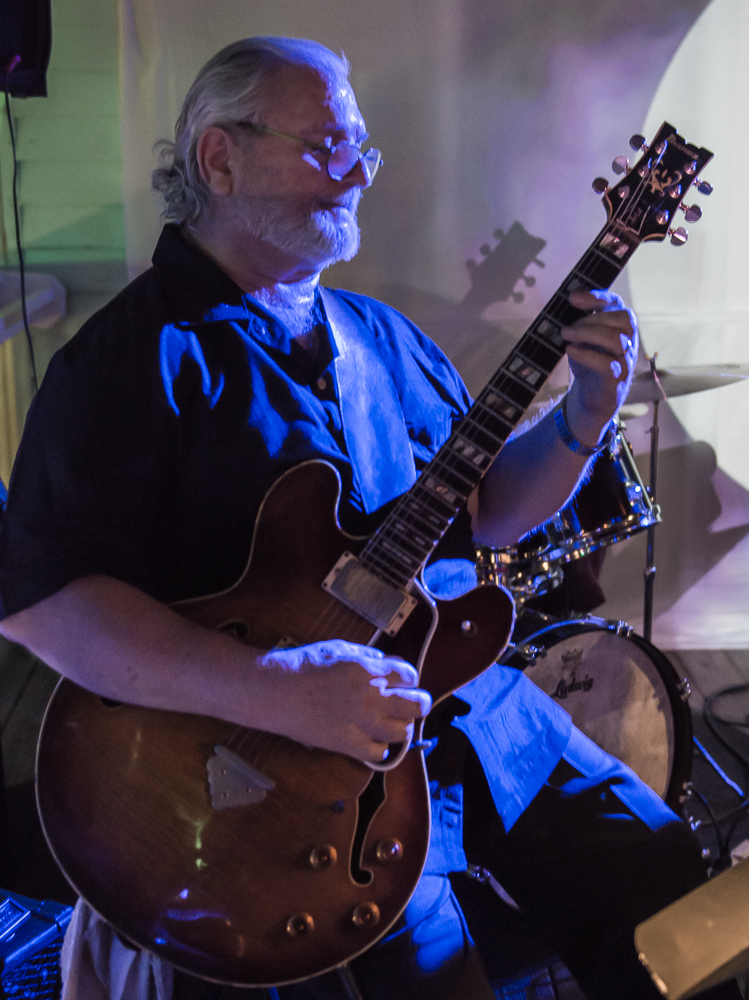Never Worked A Day In My Life
Michael Gillis – “Never worked a day in my life.”
By Ralph De Palma

John Michael Gillis was born in Hudson, New York. He spent his childhood in Atlanta, Georgia and Grove Hill, Alabama. Michael said, “I became obsessed with music by the time I was 10 years old. Even when I really loved a woman, my first love was music.”
He had a few piano, trumpet, and drum lessons in grammar school but was mostly self-taught on guitar and bass. In the early days, jazz studies were not formalized or codified. Michael listened and copied the best jazz musicians. It was not important to sound the same – it was more important to learn the language.

Jazz Night with Mike Gillis and Denis Hyland.
Gillis came to Key West in 1965, after he had accomplished a great deal in his career. His long resume includes guitarist, bassist, arranger, composer, and educator. He played with big bands: Buddy Rich, Louis Bellson, and Count Basie All Stars. He made appearances on at least eight major television programs, including Steve Allen, Merv Griffin, and Johnny Carson. Gillis played most of the major jazz festivals, including Newport, New Orleans, and Monterey. He performed to packed houses at Caesar’s Palace in Las Vegas, Al Hirt’s Club in New Orleans, and a list of other clubs – too many to mention. During the 1960s, Mike was considered the “benchmark” for New York Studio guitarists.
From 1968-1969, Mike toured with numerous Motown groups: The Temptations, The Supremes, Smokey Robinson, Stevie Wonder, and his personal favorite, James Brown. They rehearsed at the bowling alley down the street from the “Hitsville” studio. Later, James Brown recorded a jazz album live at the Apollo Theater – one of the many highlights of Mike’s career.
In 1972, Mike started teaching music in the jazz department at the University of Miami School of Music. He taught harmony and theory, composition, guitar theory, and improvisation. Most universities could find jazz players but had difficulty finding those who could speak and teach music with the academic language and traditional European classical terminology. Likewise, the schools had difficulty finding academic teachers who could really play jazz – Gillis filled that niche.
 Mike loves all music but, as a professional musician, he enjoys jazz because he feels it’s the most interesting and difficult of the performing arts. He says jazz originated in either New Orleans or Kansas City. It came out of the fields, worked by slaves, from their blues and tears, coupled with simple European music. As a jazz guitarist in Key West, Mike views Larry Baeder as the “real deal”. He feels “People are dying for good music, even if it’s not world class. If it’s just organized, they’ll love it.”
Mike loves all music but, as a professional musician, he enjoys jazz because he feels it’s the most interesting and difficult of the performing arts. He says jazz originated in either New Orleans or Kansas City. It came out of the fields, worked by slaves, from their blues and tears, coupled with simple European music. As a jazz guitarist in Key West, Mike views Larry Baeder as the “real deal”. He feels “People are dying for good music, even if it’s not world class. If it’s just organized, they’ll love it.”

Jazz Night with Mike Gillis, Hal Howland, Rock Solomon, Joe Dallas, George Helmut
As the consummate teacher, Mike gave some insight into how to write a song: Start with an interesting story, put together a piece that is harmonically interesting – not too abstract, all the best ways of saying “I love you” have been done, great composers take you on a magical mystery tour. There are two ways to approach the creating of lyrics and their musical accompaniment: the mathematical approach and the organic approach. If you learn the tools, both ways of creating music are easy, similar to learning a new language and becoming fluent.
Gillis’s cool definition of art: “The phenomenon of art is a selective re-creation of reality according to the artist’s metaphysical value-judgments.”
A favorite Key West music experience was with his six-piece big band, Michael Gillis and Company, at the old Havana Docks Bar in 1982. Many musicians were his former students from the University of Miami. Gillis insists he has enjoyed all of his “playing jobs” because he was accepted as a peer playing with many musical idols. He said, ” None was more fantastic than any other. They all have been like dreams come true.”
John Michael Gillis has battled serious health issues the last five years but, at 77, he does not feel he got a raw deal in life. To the contrary, he feels he got the best deal; he performed with the best players and says, “My career has been wonderful. I got to do just about everything I ever wanted. I never worked a day in my life. I’ve been able to do what I love.”

Skipper Kripitiz on drums, Mike Gillis, and Bubba Lownotes on bass.



What a remarkable journey Michael Gillis has had
in the world of music! His passion for music, especially jazz, shines
through in his illustrious career. It’s inspiring to see how he has managed to turn his love for music into a successful career,
working with some of the biggest names in the industry.
His contributions as a musician, arranger, composer, and educator have undoubtedly left a significant impact on the jazz community.
His perspective on jazz being the most interesting and difficult of the performing arts
is something that resonates with many. Jazz, indeed, is a complex genre that requires a deep
understanding of music theory and exceptional improvisational skills.
It’s fascinating to learn about his teaching approach, combining academic language with practical jazz skills, which seems to have filled a
significant gap in music education.
His definition of art as a “selective re-creation of reality according to the artist’s metaphysical value-judgments” is thought-provoking.
It underscores the subjective nature of art and the role of the artist’s personal values and
perspectives in creating art.
Despite his health challenges, Michael’s positive outlook on life is truly commendable.
His statement about never having worked a day in his life because he got to
do what he loved is a testament to his passion for music.
It’s a powerful reminder for all of us to pursue our passions and make our
careers out of them.
Thank you for sharing this inspiring story about Michael Gillis.
It’s a beautiful tribute to a man who has dedicated his life to
music and has made significant contributions to the jazz world.